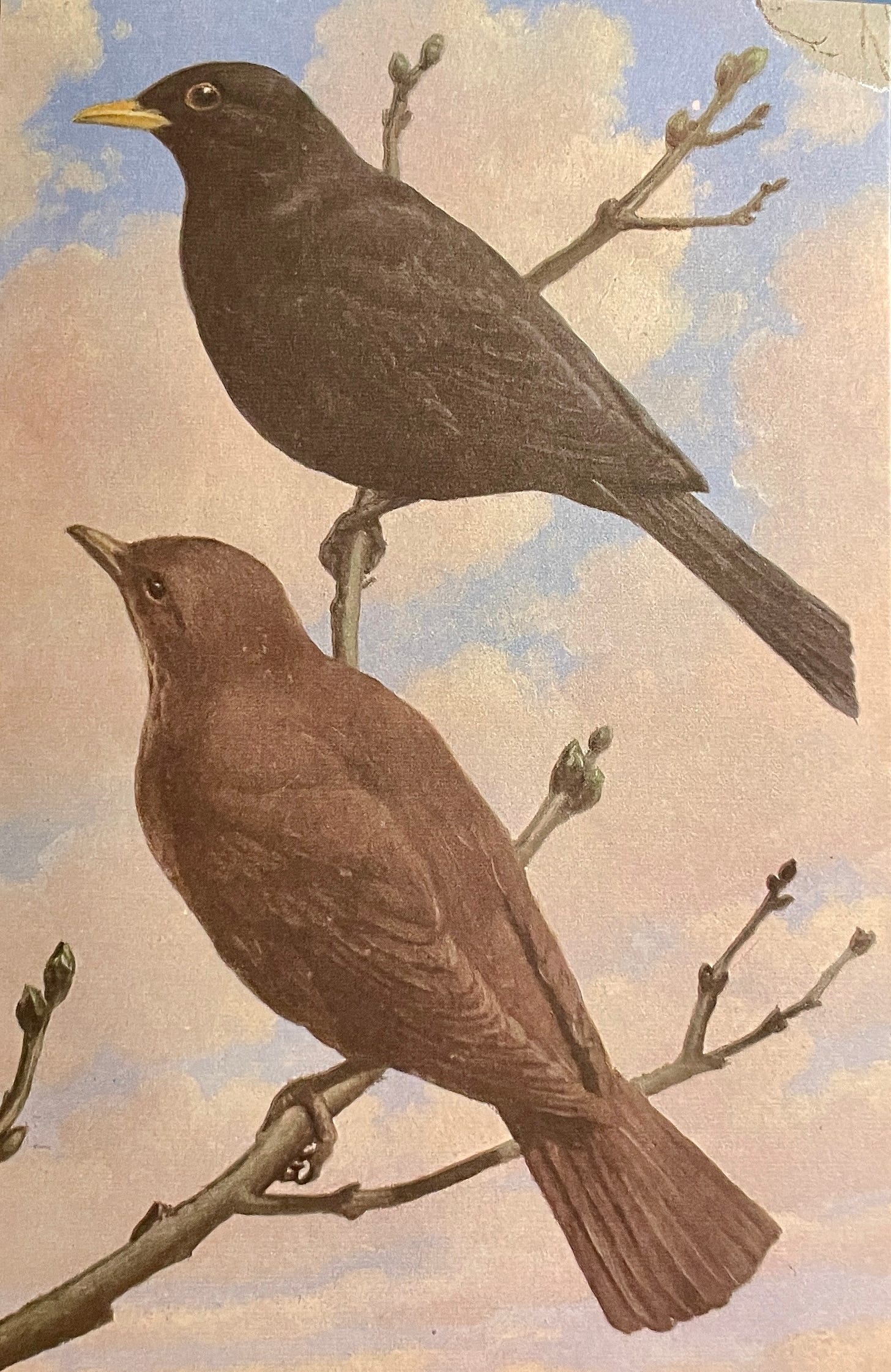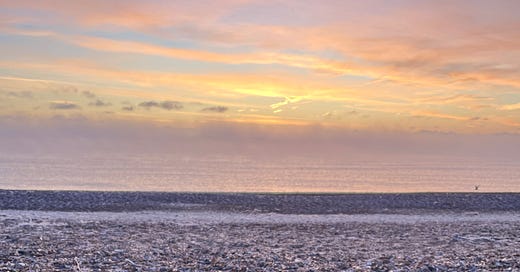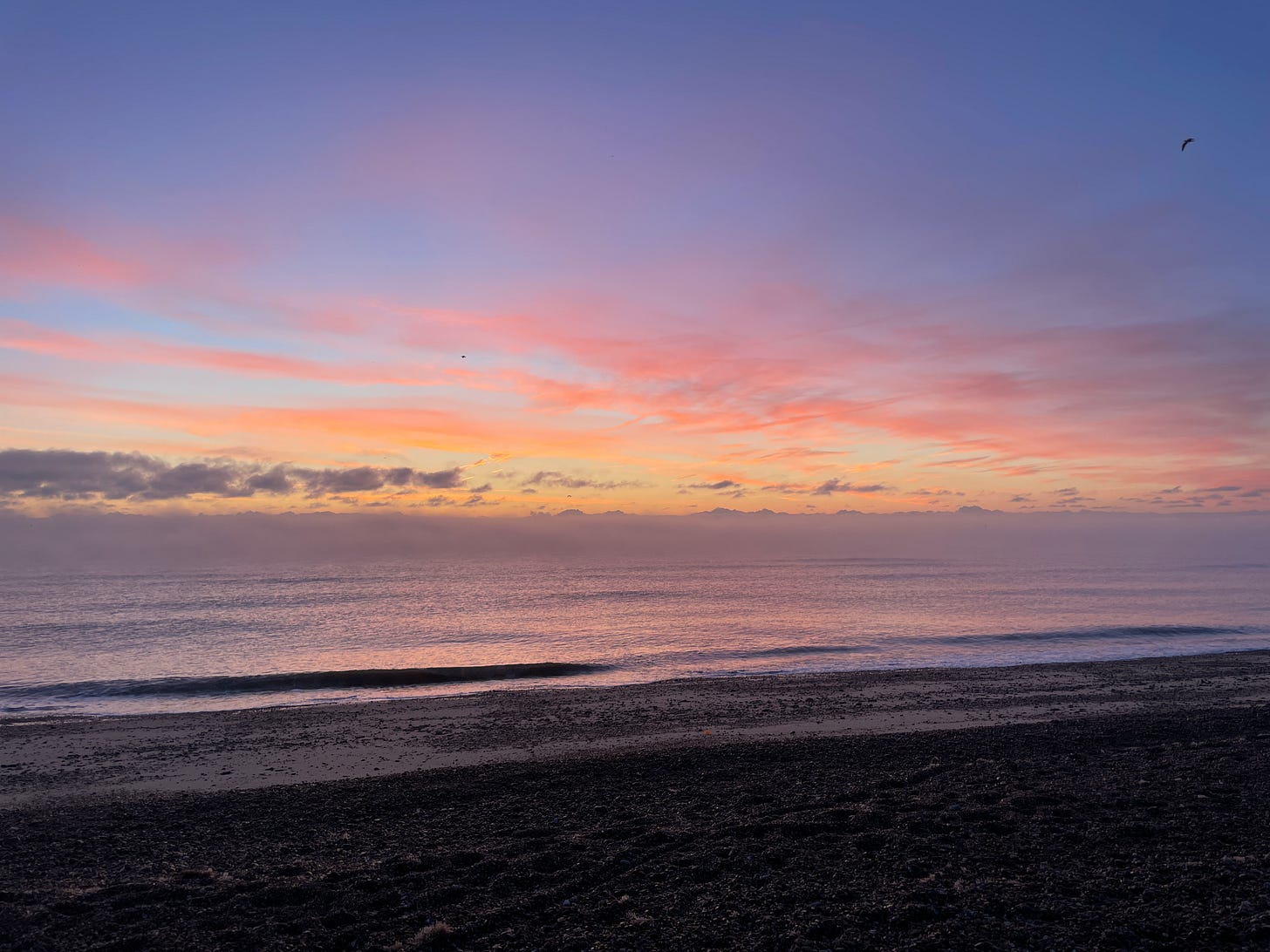It's just the sun rising
How not to chase epiphanies – and why you should take yourself seriously sometimes
I can think of only two occasions when the alarm going off in a pitch-black bedroom feels acceptable: when you need to get to the airport to catch a flight to somewhere exciting, or when you’re getting up to listen to the Dawn Chorus at its peak in May (straight back to bed after, and then up again at a sensible time). Yet there I was, sitting up in the dark and fumbling for my phone to turn off its godawful noise. Ten minutes or so later I was out of the house with a thermos of hot tea.
…and then I was back in the house to run a jug full of warm water because the car was iced over. But eventually I got myself sorted out and I was on the road, a beanie hat under the hood of my puffa jacket, scarf around my neck and the car heater on full. The night before I’d walked to the pub in the next village and back home again under a spectacular full moon. Standing in the middle of a dim sheep field fortified by a couple of glasses of wine and a steak and kidney pudding, my moon-shadow sharp on the cold ground behind me and the tremulous sound of a tawny issuing from a distant wood, I found I wanted more of the feeling I was experiencing. By the time I got back to my cottage I’d decided to get up early the next morning and drive east to see the sun rise.
And so I had. A dense mist had formed overnight and hung low still, blanketing the farmland around the village; the sun would burn it off soon, but although the sky was lightening, it hadn’t cleared the horizon yet. My headlights made a tunnel through it and I was glad of the white marks of the road’s centre line. There was very little to see on either side, only the occasional skeleton of a tree breaching the white tide and here and there the dim shape of a pheasant hurrying away from my approaching headlights. With no other traffic on the road it felt disorientating and strange; despite the dial on my dash it was difficult to really feel how fast or slowly I was driving in such a featureless space.
There’s a section of road on the way to the coast that takes in several 90-degree corners, one after the other after the other. Although the agricultural land on either side is now flat, blank and completely open, it was clearly once a patchwork of small, hedged fields around whose margins the road historically navigated – hence its still tortuous course. There are no hedges alongside the road now, either, something I’d normally regret but which, in this case, is crucial: that many blind bends could well prove lethal, and probably have. The downside to the improved visibility is that kids in souped-up cars sometimes use this stretch of road as a rally track. I hoped that none had got up as early as me.
That morning the mist made each upcoming bend invisible until I was almost upon it. I nosed on in low gear, not enjoying the drive but still managing to take in its strangeness, watching the sky lighten from black to blue ahead of me until at last I was done with the bends and on the straighter roads to the sea.
I made it on to the beach with my Thermos with ten minutes to spare before sun-up. The clear night’s hard frost still gripped the shingle so that it did not shift or give under my boots, and the sky to the east was pink and apricot, limned with gold. Gulls rode the quiet sea and occasionally drifted overhead. A man in cargo shorts appeared, took a photo, and wandered off again. It was staggeringly, toe-achingly cold.
As the sun cleared the sea I waited for a sense of… what? Inspiration? Connection? I wasn’t sure – but try as I might, it wouldn’t come. ‘It’s just the sun rising…’ played on a loop in my head, a line from an old rave classic I’ve listened to more than once at dawn, including on Ibizan beaches where a sense of the divine, after eight hours on the Space Terrace, seemed far more easily within reach. The Suffolk sky was beautiful, and the sea looked peaceful and serene, but I found myself wondering what time Tesco opened and whether I’d be able to pick up a few bits on the way home: bacon, particularly (I really wanted a bacon sandwich). Chilli oil. Pasta. A lemon – did I have a lemon? Definitely loo roll.
Disappointing, isn’t it? Do you feel a bit cheated as you read this, a bit frustrated by the lack of an epiphany? Don’t worry, so did I. But I’ve come to learn, over the years – and despite frequently forgetting it – that you can’t just order up those moments of communion with nature: all you can do is try to put yourself in the right place for them to happen by going out as often as you can manage so that you’ll be in the way of them, when they come.
So much writing about place and nature (although thankfully not all) focuses on the revelatory experience and glosses over the rained-off walks, the failed attempts to see something, the days when you’re just too tired, too stressed or too distracted to spot, hear or feel the kinds of things that readers want you to describe. And while that’s perfectly natural – who wants to read a series of pieces about someone merely traipsing about? – I worry that it might create the impression that nature writers have access to a higher plane of consciousness, one that reliably generates transcendent experiences beside which their own, more humdrum encounters pale. And then, when they go out for a walk and it isn’t miraculously inspiring, it could feel as though they’re somehow not doing it right.
I’m glad I got up and saw the sunrise. I know what it looks like now, on a frosty morning, coming up out of the North Sea. But more importantly, the experience has reminded me that although beaches can be beautiful, they’re not one of the things that naturally trips a switch for me. The farmland I drove back through, mistless and unabashed in the clear morning light: that’s where my heart lives, moved by the marks left by man’s long partnership with nature, a partnership whose rules must constantly be redrawn.
Here’s the truth. For every twenty walks I go on, two might produce a fleeting feeling, sometimes moving but often too numinous to catch in words; one might result in a sighting of something noteworthy, whether that’s a cool bird, an animal print or just the way light falls on a gnarled oak bole. Given that hit rate, it’s the getting out there that counts, at different times of day and in different weathers, all the while learning to appreciate the ordinary and everyday. That’s what forms the context for the more immanent moments, when they come.
And there’s something to be said, too, for following where your heart leads, no matter how faint or seemingly illogical the signal: like someone gently holding a dowsing rod, alert to when it jumps. The things you need from nature might not be the same as the things that do it for your partner, your parents, your kids or anyone else you’ve ever come across; you might not need the big views that people take photos of, the rare species, or the beauty spots.
When I next get up in the dark before dawn it will be to see the sun rise over hedged fields, black barns and deep farm lanes, and to hear the May birds sing.
Encounter
As most of you will know, I’m developing a free app, called Encounter, aimed at helping people in the UK connect with nature. It’s a guided nature journal that lives in your phone, full of seasonal prompts and information so you know what to look out for; you can record your encounters via text, audio, photos and video, and plot your walks on a map. We’re hoping to launch sometime in summer.
Recently we recruited a testing panel, sent out a questionnaire and conducted some one-to-one interviews. Now we’re working on a prototype which we’ll be ready to share soon. If you’re one of our volunteers, keep an eye on your inbox. It’s all very exciting (and terrifying too).
What to look for in March
I have heard my first blackbird song of spring! It was on March 9th, which was warm and sunny, and it happened in a supermarket car park, a characteristic setting for this familiar, suburban bird. I love blackbirds so much: their friendly, fluting music that carries us from early spring to the end of July and then dies away, so that we miss it; the way the hen blackbird sits so tight, rain or shine, on a nest that always seems a little bit too small for her, so that she looks stuffed in; the afternoon recitals the male gives from chimneys and aerials; the way that, if you pay proper attention, you can learn to recognise the song of ‘your’ garden blackbird from that of his rivals nearby, something impossible with, say, dunnocks or wrens. And their song is just so cheerful, isn’t it? Fluting and happy, and rarely wistful, like the robin’s. It is a happy, uncomplicated carolling that speaks of sunshine and warmth and pure good times.

If you haven’t heard a blackbird yet this year, the first thing to do is to tell your brain not to filter out birdsong of any kind – something that many of us do without realising what we’ll lose by doing so. To maximise efficiency, we learn not to see, hear or feel SO many things – but that can be reversed by the simple act of deliberate noticing. Think of your brain as an algorithm on social media: it learns what you want to interact with and gives you more of the same, whether those things do you good or not. Switching from things that hurt or harm us to things humans are hard-wired to derive all sorts of benefits from by dint of our long evolution within nature is surprisingly easy, and brilliantly effective. Why not start, this spring, with birdsong?
In the next section, about creativity, I’ll be writing about taking yourself seriously – but not too seriously, of course. For £3.50 a month you’ll also get access to all the previous newsletters via the archive, including the essay beneath the paywall here, in which I try to answer the common question: ‘Where do you get your ideas?’. You’ll also be able to leave comments, as well as helping me to set aside the two days a month it takes to produce this newsletter, and ultimately, write more books.
If you’ve enjoyed this edition of Witness Marks, please consider sharing it on Substack, posting it on your socials, or forwarding the email. And as always: thank you so much for reading. I’m really glad you’re here.
Keep reading with a 7-day free trial
Subscribe to Witness Marks by Melissa Harrison to keep reading this post and get 7 days of free access to the full post archives.






